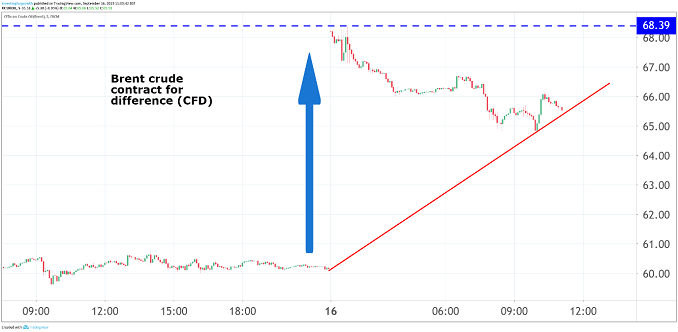Why oil prices have rocketed and the shares that benefit
A near-20% surge in oil prices provides a much-needed boost to the sector. Here are the beneficiaries.
16th September 2019 11:58
by Lee Wild from interactive investor
A near-20% surge in oil prices provides a much-needed boost to the sector. Here are the beneficiaries.

After a terrible summer for the large cap oil stocks, this weekend's fireworks in Saudi Arabia breathed life back into a sector popular among private investors.
Drone attacks on state oil company Saudi Aramco's Abqaiq crude processing plant and a plant in the Khurais field caused the suspension of 5.7 million barrels of crude oil production per day. That's more than half Saudi's total output and more than 5% of global oil supply.
Houthi rebels, currently fighting a bloody war against the Saudi-backed government in Yemen, claimed responsibility for the attacks. But US secretary of state, Mike Pompeo, lays the blame firmly at the door of Iran, which backs the Houthis.
The scale of the attack and its impact on global oil supply is unlike anything seen before, exceeding disruption caused by the 1990 Gulf War and Islamic Revolution in 1979.
Oil prices reacted predictably, surging almost 20% in early trade, although they have since given back some of those gains.

Source: TradingView Past performance is not a guide to future performance
Clearly, the big oil companies are beneficiaries. Royal Dutch Shell (LSE:RDSB) and BP (LSE:BP.), whose share prices had fallen 13% and 8% respectively since the end of July, are up 3% and 4% Monday.
Mid-cap oil stocks dominate the list of risers Monday. Tullow Oil (LSE:TLW) is up 10%, Premier Oil (LSE:PMO) 9%, Wood Group (LSE:WG.) 5%, with Cairn Energy (LSE:CNE), Hunting (LSE:HTG) and Petrofac (LSE:PFC) close behind. Elsewhere, SOCO International (LSE:SIA) is doing well.
But there are big losers in all this, chiefly the airlines and cruise operators amid concerns around the sharp hike in cost of fuel. Travel companies and jet owners like easyJet (LSE:EZJ), International Consolidated Airlines (LSE:IAG), TUI (LSE:TUI), Carnival (LSE:CCL) and Wizz Air (LSE:WIZZ) are all trading lower.
- Commodities outlook
- Get broad exposure to financial markets through this ii Super 60 recommended fund
Of course, the full repercussions will depend very much on the length of time the Saudi production is out for. Saudi Aramco CEO and president Amin H. Nasser said: "Work is underway to restore production and a progress update will be provided in around 48 hours."
For now, Saudi will supply customers out of inventories, which will last about 28 days, and total OECD supplies cover about 60 days of total demand.
According to analysts at UBS, "a reassessment of risk pricing will likely presumably come in the aftermath of this attack. To take out over 5% of global supply in a single strike - a volume exceeding cumulative non-OPEC supply growth over 2014-2018 - is highly worrying.
"While US-China trade and US oil supply growth have been the primary price drivers we see a return of the political risk premium as the market has been arguably complacent about risk events."
Many believe this, plus the threat of further outages, could send the price of oil back up to $80 a barrel. Ironically, the Saudis have made no secret that they want the oil price higher. While this will not have been the preferred method, the short-to-medium-term impact on prices may be helpful.
These articles are provided for information purposes only. Occasionally, an opinion about whether to buy or sell a specific investment may be provided by third parties. The content is not intended to be a personal recommendation to buy or sell any financial instrument or product, or to adopt any investment strategy as it is not provided based on an assessment of your investing knowledge and experience, your financial situation or your investment objectives. The value of your investments, and the income derived from them, may go down as well as up. You may not get back all the money that you invest. The investments referred to in this article may not be suitable for all investors, and if in doubt, an investor should seek advice from a qualified investment adviser.
Full performance can be found on the company or index summary page on the interactive investor website. Simply click on the company's or index name highlighted in the article.